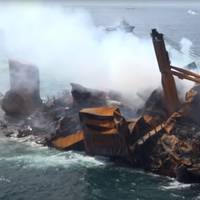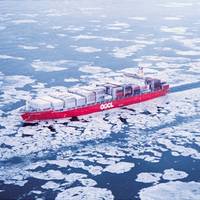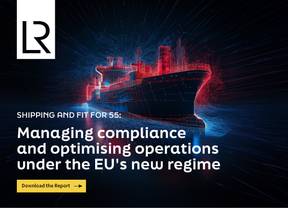Sri Lanka Prepares for Oil Spill after X-Press Pearl Ship Sinks

Sri Lanka on Thursday readied for the possibility of an oil spill after a cargo ship laden with chemicals sank off its western coast.The Singapore-registered MV X-Press Pearl, carrying 1,486 containers, including 25 tonnes of nitric acid along with other chemicals and cosmetics, was anchored off the port city of Negombo when a fire erupted onboard after an explosion on May 20.Flaming containers filled with chemicals tumbled into the sea from the ship's deck as emergency crews sought to contain the blaze over the ensuing two weeks.The craft began to sink early on Wednesday…
CAA Welcomes MSC 's Shelving Arctic Routes
Clean Arctic Alliance has welcome MSC Mediterranean Shipping Company's decision to avoid Arctic shipping route as a new short cut between northern Europe and Asia.Clean Arctic Alliance lead advisor Dr Sian Prior was responding to the announcement that shipping company MSC “will not explore or use the Northern Sea Route between Europe and Asia for container shipping” and that it believes that shipping lines should focus on reducing the environmental impact of existing shipping trade routes”.“The Clean Arctic Alliance welcomes MSC’s decision to avoid using the Northern Sea Route to ship goods between Asia and Europe. While MSC have understandably come under fire for their environmental record elsewhere…
Ocean Conservancy Calls for Clean Arctic
“Ocean Conservancy welcomes steps taken by the International Maritime Organization to mitigate risks to the Arctic from the use and carriage of the world’s dirtiest fossil fuel. “Support for Measures to Reduce Risks of Use and Carriage of Heavy Fuel Oil as Fuel by Ships in Arctic Waters marks an important milestone in the bid to phase out the use of heavy fuel oil in the Arctic. “With climate change impacts resulting in record-breaking loss of sea ice—winter ice in the Arctic hit a record setting low in 2017 since records began 38 years ago—there will be a dramatic increase in vessel traffic through shorter Arctic sea routes to transport cargo between Southeast Asia and Europe. At present, around 75% of marine fuel currently carried in the Arctic is heavy fuel oil.
Clean Arctic Alliance Praises Move to Phase out HFO Use
Responding to the December 20th joint statement from the United States and Canada, regarding development of a strategy to phase out their use of heavy fuel oil (HFO) from vessels operating in the Arctic, the Clean Arctic Alliance praised both Arctic nations for their ambitious action to rid the region of the dirtiest marine fuel. “The Clean Arctic Alliance applauds the commitment of President Obama and Prime Minister Trudeau to develop a concrete proposal to phase down HFO use in the Arctic”, said Clean Arctic Alliance advisor Dr Sian Prior. The US and Canada have also agreed to propose a plan for the next meeting of the International Maritime Organization’s Marine Environment Protection Committee (MEPC 71, July 2017) in order to implement the work necessary for a phase out.
Clean Arctic Alliance Response to Arctic HFO Ban
“The Clean Arctic Alliance welcomes AECO’s reconfirmation of its support for an international ban on heavy fuel oil in Arctic waters. AECO’s decision demonstrates the growing conviction within the shipping industry that the Arctic is simply too vulnerable and too fragile to allow the use of this dirtiest of fuels, and that HFO can no longer be considered an option for powering Arctic shipping in the future”. “By acknowledging the threats posed by spills and black carbon emissions from heavy fuel oil, the Arctic cruise industry has recognised that while it expands, it must phase out of this dirty fuel in order to protect the environment and human health, and safeguard coastal communities and food security”, continued Prior.
IMO Moves toward Phase out of HFO in the Arctic
The International Maritime Organization’s (IMO) Marine Environment Protection Committee (MEPC70) meeting brought progress by member countries toward a phase out of the use of heavy fuel oil (HFO) by vessels operating in the Arctic. Heavy fuel oil (HFO) breaks down extremely slowly in cold Arctic waters and is very difficult clean up in the event of a spill. While HFO powers some 44 percent of the ships currently operating in the Arctic, it accounts for more than 75 percent of the fuel onboard those ships, according to ICCT figures. HFO is already banned throughout Antarctica and in the national park waters around the Norwegian Arctic archipelago of Svalbard, leaving only a strictly regulated corridor for ships to access the islands.
Heavy Fuel Oil Spill at Port of Long Beach
Approximately 33 gallons of heavy fuel oil was spilled during bunkering operations at an anchorage inside the Port of Long Beach Saturday morning, The U.S. Coast Guard reported. The U.S. Coast Guard, state of California, and response crews are responding. A boom has been set-up to contain the spill and commercial cleaning crews are on-scene. California's Department of Fish and Wildlife, Office of Spill Prevention and Response personnel are on-scene monitoring the operations, as well as Coast Guard pollution responders.
Environmental Groups: IMO Polar Code Too Weak

The International Maritime Organization (IMO) today adopted the Polar Code aimed at regulating shipping in Polar Regions. Several environmental groups have criticized the measures for not going far enough to protect the Arctic and Antarctic environments, arguing that while the new code is a positive step forward, it is insufficient to properly protect Polar environments from the anticipated increased levels of shipping activity. The Polar Code is due to enter into force on January 1…
Ohio River Reopens as Oil Spill Clean-up Progresses
A 15-mile section of the Ohio River was reopened for limited traffic on Wednesday as clean-up of a 5,000-gallon fuel oil spill continued, the U.S. Coast Guard said on Wednesday. The Coast Guard closed a stretch of the river between Cincinnati, Ohio and Dayton, Kentucky on Tuesday after a spill during a "routine transfer of fuel oil" at a 60-year-old power plant owned by Duke Energy, 20 miles east of Cincinnati. "The river is open. Vessels can transit as long as they call the Coast Guard command center to get permission first," said Lt. Kate Cameron of the U.S. Coast Guard. Restrictions on traffic will continue as the clean-up progresses, the Coast Guard said, without giving a timeline.
LR Addresses Fuel Changes when Entering and Exiting ECAs
From January 1, 2015, the maximum sulphur content of fuel oil used within the MARPOL Annex VI Emission Control Areas (ECAs) will be 0.10%, unless using an approved alternative means for controlling sulphur emissions. In most cases, the fuel used will be low-sulphur distillate oil (LSDO). Many ships operating both inside and outside ECAs will changeover between LSDO and residual fuel oil (RFO) when entering and exiting ECAs. The Lloyd’s Register (LR) Rule requirements for fuel oil systems are contained within Pt.5 Ch.14 sections 2, 3 and 4; these contain design requirements for systems which are to operate on either LDSO or RFO grades, or both. LR also offers the optional descriptive note, DIST, for shipowners and operators applying industry best practice to the use of LSDO.
Bulker Fuel Oil Spill Clean-up Off Norfolk Va. Continues
The US Coast Guard says it continues to monitor clean-up efforts in the Elizabeth River at Lambert's Point in Norfolk. The National Response Center contacted Coast Guard Sector Hampton Roads Command Center watchstanders at approximately 3:20 p.m. Friday reporting a fuel spill aboard the Ostria S, a 740-foot bulk carrier. Sector watchstanders dispatched a Coast Guard pollution response crew to the scene to oversee the cleanup efforts. Accurate Marine Environmental Incorporated personnel placed 3,000 feet of containment boom around the vessel and pier to contain the fuel. Personnel from Marine Spill Response Corporation, the oil spill response organization, arrived on scene Friday and began cleanup operations. Cleanup efforts are expected to continue through Sunday.
Olympic Tug & Barge Fined for Port Angeles Oil Spill
The Washington Department of Ecology (Ecology) is fining Olympic Tug & Barge of Seattle $16,500 for spilling oil into Port Angeles Harbor last November. The spill occurred when a company-owned fuel barge was overfilled while being loaded with fuel oil. Ecology determined the Nov. 7, 2012, heavy fuel oil spill occurred because of an error by the barge operator. More than 1,700 gallons of fuel spilled to the deck of the barge with nearly 50 gallons entering Port Angeles Harbor. The oil transfer was being conducted at the Tesoro Port Angeles Terminal located at the foot of the spit Ediz Hook. Olympic Tug & Barge had oil containment boom placed around the barge prior to starting the fuel transfer which helped contain the spill.
Mississippi River Bunker Spill
The U.S. Coast Guard responded to a fuel oil spill on the Lower Mississippi River near Norco, La. Reportedly, the freighter Bright State struck the tanker Genmar Alexandra while the latter vessel was moored at a dock. It is estimated that 22,000 gallons of bunkers were spilled from the tanker as a result of the allision. The Coast Guard is responding to the spill and investigating the incident. The National Oceanic and Atmospheric Administration (NOAA) also issued a release stating that it has dispatched a team of scientists to the spill site to provide trajectory forecasts, advice on response techniques, and damage assessments. (HK Law).
Spill in Portland
The Coast Guard is investigating a minor fuel oil spill that occurred Monday night at approximately 7:00 p.m. at Terminal 6 in Portland from the HYUNDAI NO. 106, a Liberian flagged car carrier. The leak was discovered by the ship's crew during mooring operations when they observed a slight seepage from the vessel's side. Their crew quickly determined that the oil leak was due to several small cracks and they immediately reomoved the fuel from the tank. Coast Guard Sector Portland personnel responded to the incident to ensure all repairs were properly conducted, that all spilled oil was contained and to determine the cause of the cracks. The amount of fuel oil released into the water is estimated to be less than 50 gallons.
Unified Command Responds to NY Oil Spill
A Unified Command comprised of the U.S. Coast Guard, the New York State Department of Environmental Conservation (NYSDEC), and Penn Maritime Inc. continue to respond to a #6 fuel oil spill that occurred Oct. 14, 2006. The amount of oil spilled is unknown but is estimated to be as much as 800 gallons. The spill occurred on the deck of the barge P-120 owned by Penn Maritime Inc. berthed on the south side of the ConocoPhillips offshore platform located approximately one mile from the north shore of Long Island. The spill was stopped and containment boom was immediately deployed around the barge upon discovery. Adverse weather conditions are believed to have contributed to the impact of the oil spill. Penn Maritime Inc. and ConocoPhillips are fully cooperating with the U.S.
Washington-Civil Penalties for Pollution
The Washington State Department of Ecology has summarized civil penalties it assessed during the second quarter of 2006 for pollution incidents. Among others on the list were three marine-related parties. Two of the penalties indicate the possibility that the Department has become too zealous in its mission. In June, the captain of the vessel Nu C was fined $9,000 after approximately 575 gallons of diesel and hydraulic oil spilled into Grays Harbor when the vessel crashed into the North Jetty at Ocean Shores on February 12. In May, a tank barge owner was fined $1,000 after its barge spilled 109 gallons of heavy fuel oil into the Strait of Georgia when it sustained damage from a tug during docking.







